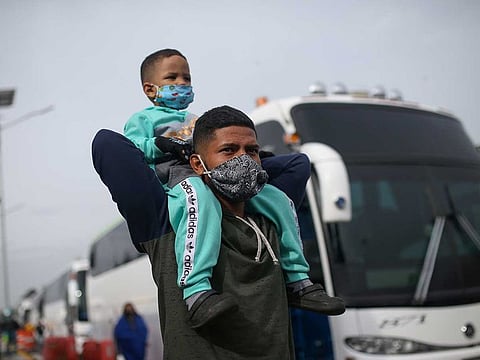More jobs at risk as countries begin easing COVID-19 curbs
A look at the top coronavirus related stories from around the world

Dubai: As more countries take steps to ease the lockdown that has been in place to fight COVID-19, the International Labour Organisation has warned that three-fourths of workers in the informal sector, numbering around 1.6 billion, risk losing their livelihoods.
The ILO said an expected further sharp decline in working hours in the second quarter of 2020, due to the COVID-19 crisis, meant that those workers were in "immediate danger of having their livelihoods destroyed".
The Swiss government has said that shops, restaurants, museums, libraries and schools can reopen on May 11, while Spain announced a phased return to normalcy.
Prime Minister Pedro Sanchez announced late on Tuesday a four-phase plan to lift one of the toughest coronavirus lockdowns in Europe that would culminate in a return to normality by the end of June.
Airborne droplets
Chinese scientists have identified genetic markers of the virus in airborne droplets, many with diameters smaller than one-ten-thousandth of an inch, adding to evidence that the coronavirus can spread through air. The scientists studying real-world conditions report that they captured tiny droplets containing the genetic markers of the virus from the air in two hospitals in Wuhan, China, where the outbreak started. Their findings were published Monday in the journal Nature. It is not known if the virus in the samples they collected was infectious, but droplets that small, which are expelled by breathing and talking, can remain aloft and be inhaled by others.
Beach disinfected
The head of a Spanish coastal town has apologised after “disinfecting” nearly 2 km of sandy beach with watered-down bleach in a misguided effort to avoid the coronavirus spread, AP reported.
Agustin Conejo, head of the local council of Zahara de los Atunes, told local media the bleaching was ordered with the goal of protecting children, who were allowed Sunday to play outdoors for the first time in weeks of mandatory confinement.
Three tractors used for fumigating farming land combed a stretch of the beach while spreading 1,000 litres of water with a concentration of 2% of bleach, the regional Diario de Cadiz reported.
Regional environmental authorities have opened a disciplinary report that could lead to fining the town.
Spain, with 24,000 confirmed deaths from coronavirus, is slowly reopening after a strict lockdown in place since mid-March.
Nearly 1m tests a week in Germany
German labs are now able to carry out almost 900,000 tests a week for the novel coronavirus, officials said on Wednesday, as they plan to widen testing among health workers. Roughly 470,000 tests were carried out last week, suggesting there is spare capacity that could help prevent outbreaks among medical staff at hospitals and care homes, AFP reported.
From Wednesday in Germany, masks will be needed to enter shops, which began to open last week after the government declared the outbreak under control.
Nose and mouth coverings are already compulsory on buses, trains and trams.
Forbidden City to reopen
China's Forbidden City will reopen on Friday, three months after it closed due to the coronavirus crisis. The sprawling imperial palace sitting across Tiananmen Square was shut down on January 25. The Palace Museum, which manages the Forbidden City, announced Wednesday that it will reopen from May 1, with a daily limit of 5,000 visitors - down from 80,000 before the pandemic.
Recession in Germany
The coronavirus pandemic will plunge Germany's economy into its deepest recession since World War 2, Economy Minister Peter Altmaier said on Wednesday.
Berlin cut its estimate for gross domestic product (GDP) growth in 2020 to -6.3% from +1.1% predicted in January. It expects the recession to bottom out in the second quarter and economic activity to pick up again after that, provided a second wave of infections can be avoided.
India cases puzzle experts
In India, experts have been puzzled that there have been only 1,000 deaths in the country, a low number compared with Europe and the United States. There were fears earlier that India would be ravaged by the pandemic that has killed more than 214,000 people worldwide. India appears so far to have been spared the devastation seen in New York, Milan and other hard-hit parts of the world, where hospitals have been overwhelmed by cases of coronavirus.
US toll surpasses number of Americans killed in Vietnam war
The United States has reported its millionth coronavirus case, and at over 58,000 the country's COVID-19 death toll is by far the world's highest - surpassing the number of Americans killed in the Vietnam war.
Italy, Spain and France have been the worst affected European countries, with each reporting more than 23,000 deaths.
According to the National Archives, 58,220 Americans were killed in combat and from and other causes during years of war in Southeast Asia.
Sunseekers
Scientists are scrambling to develop treatments and a vaccine, with myriad studies under way - including one from the US Department of Homeland Security into how ultraviolet radiation destroys the virus.
Trump raised eyebrows last week when he asked whether light could become a medical treatment.
While that research has not yet been published, people in Indonesia are soaking up rays in the hope that the tropical country's plentiful sunshine will ward off the disease, AFP reported.
- with inputs from Reuters and AFP







